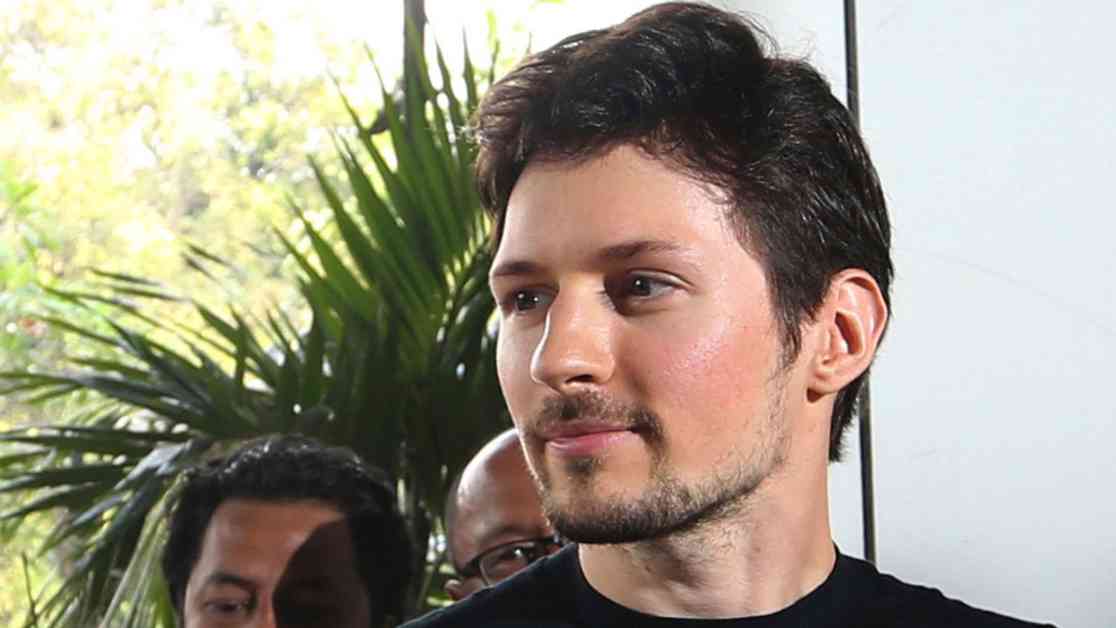Pavel Durov, the enigmatic chief executive of the popular messaging platform Telegram, has found himself embroiled in a legal battle over allegations of enabling criminal activity on his app. The French authorities have charged Durov with allowing the platform to be used for nefarious purposes, including facilitating child sexual abuse material, drug trafficking, and fraud. Despite these serious accusations, Durov has managed to avoid being held in custody by posting a hefty bail of €5 million.
Durov’s troubles began when he was arrested in France after his private jet landed at Le Bourget airport outside Paris. The Russian-born entrepreneur, who became a French citizen in 2021, is facing preliminary charges that suggest magistrates have strong reasons to believe a crime was committed. These charges allow for further investigation into Durov’s alleged role in enabling criminal activities on Telegram.
One of the key allegations against Durov is that Telegram has refused to cooperate with investigators by sharing information or documents that could aid in the legal proceedings. This lack of transparency has raised concerns about the platform’s commitment to combatting criminal behavior and protecting its users from harm. Despite these challenges, Telegram has maintained that it follows EU laws and industry standards for moderation, constantly striving to improve its practices.
The arrest of Pavel Durov in France has sparked outrage in his native Russia, where supporters have rallied to his defense by dropping paper planes, symbolizing Telegram’s logo, near the French embassy in Moscow. Some government officials in Russia have suggested that Durov’s detention is politically motivated and reflects Western double standards on freedom of speech. However, critics point out that Russian authorities previously attempted to block the Telegram app in 2018, only to lift the ban in 2020 after facing significant challenges.
In Iran, where Telegram is officially banned but still widely used, the country’s supreme leader commended France for taking a firm stance against those who violate internet governance. The international response to Durov’s arrest highlights the complexities of regulating online platforms that operate across borders and cater to diverse user bases with varying legal and ethical standards.
Despite the controversy surrounding Pavel Durov and Telegram, French President Emmanuel Macron has emphasized that the arrest is not politically motivated and underscores his country’s commitment to freedom of expression within a legal framework. Macron’s statement reflects the delicate balance between upholding fundamental rights and protecting citizens from potential harm in the digital age, where social media platforms play an increasingly influential role in shaping public discourse.
As the founder of Telegram, Pavel Durov has a complex history of navigating legal challenges and political pressures in different countries. He originally rose to prominence in Russia with the social networking site VKontakte (VK), where he clashed with authorities over issues of censorship and data privacy. Durov’s decision to sell his stake in VK and focus on Telegram demonstrates his commitment to building secure and private communication tools in the face of government scrutiny and corporate interests.
Telegram’s emphasis on end-to-end encryption and privacy has made it a popular choice for users seeking secure communication channels, especially in regions where internet freedom is restricted. However, the platform’s open nature has also attracted criminal elements and extremist groups, prompting criticism from Western governments about its content moderation practices. In 2022, Germany imposed fines on Telegram for failing to comply with regulations on reporting illegal content, highlighting the ongoing challenges of regulating large online platforms.
Despite these legal and ethical dilemmas, Telegram remains a significant player in the digital landscape, with nearly a billion users worldwide. Its impact on information dissemination and social movements, such as the war in Ukraine and far-right activism, underscores the complex role that technology plays in shaping society. As Pavel Durov navigates the legal proceedings in France, the future of Telegram and its commitment to user privacy and security will continue to be closely scrutinized by stakeholders and regulators alike.
Impact on Digital Rights
The case of Pavel Durov and Telegram raises critical questions about the intersection of technology, regulation, and individual rights in the digital age. The ability of messaging platforms to enable both positive and negative outcomes underscores the need for robust legal frameworks that balance innovation with accountability. As governments grapple with the challenges of policing online spaces while upholding freedom of expression, the case of Durov serves as a cautionary tale about the complexities of modern communication technologies.
Challenges of Content Moderation
One of the central issues surrounding Telegram’s legal troubles is the question of content moderation and the platform’s responsibility for policing illegal or harmful material. The tension between maintaining user privacy and preventing abuse highlights the difficult trade-offs that tech companies must navigate in a globalized digital environment. As Telegram faces scrutiny for its handling of criminal activities, the broader debate about online speech and platform accountability continues to evolve.
Future of Encryption and Privacy
The ongoing legal saga involving Pavel Durov and Telegram also sheds light on the future of encryption and privacy in digital communications. The tension between security and surveillance, individual rights and collective safety, underscores the complex landscape of data protection in an interconnected world. As governments and tech companies grapple with these challenges, the outcome of Durov’s case may have far-reaching implications for the future of online privacy and security.












